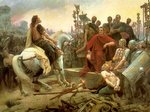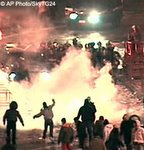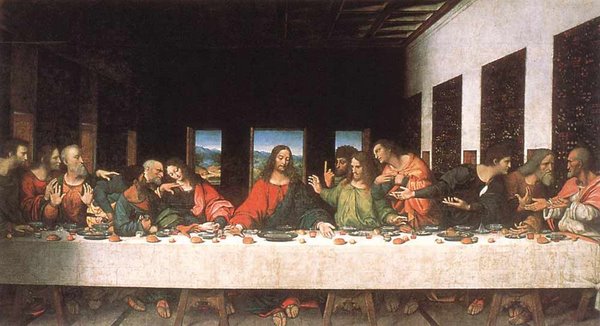
A few months ago I was appalled at the violence that followed a soccer game in Catania, Sicily. That night in February, a police officer was killed by a teen with a homemade explosive for no good reason. Afterwards, I got to thinking about soccer violence in general, and I came to the conclusion that most of it actually has nothing to do with soccer at all. Instead, the most common causes are ethnic, political, economic, or social tensions that end up being expressed and released in the adrenaline fuelled atmosphere of the stadium. Add to this the fact that the stadium is often the only place one can release these feelings without fear of government reprisals, and you begin to understand why soccer seems to be accompanied by so much violence.
In the piece I wrote that night in February (which I re-posted below when I started this blog) I suggested that the violence in Catania was based on intense regionalism and resistance to both foreign and Italian influence in Sicily, as well as a new opportunity to re-open their ancient rivalry with Palermo (a rivalry that dates back to the early 9th century). With a series of investigations into the incident by the Italian government, a new, more sinister, picture is beginning to emerge...one that I, as a Sicilian, should not have overlooked.
It appears now that the Mafia was actually behind the violence, and that the police were specifically targeted by the rioters. Essentially, it was no riot. It was a well planned attack on the Italian state by a criminal organization (one that has declared war on Italy a more than once in the past few years) working through a group of intermediaries, in this case the Calcio Catania fan clubs. After looking at the evidence, I think I have to agree with this assessment. Before you make a conclusion, though, let me show you what the evidence actually is.
1 - Catania is a city that is almost completely controlled by the Mafia. It is estimated that 95% of businesses in the city pay protection money to the Mafia cosca (clan/family) that runs the area. For many children in the poorer parts of town, a life in organized crime is the most attractive option. A large number of them end up working for the Mafia in one way or another. Some deal drugs, some commit petty crimes, others commit murder; the important thing is that a large portion of the city's youth are linked to the Mafia in one way or another. As typical Italians (although I still have trouble thinking of Sicilians as Italian, as do many Sicilians themselves), a good proportion of these young men also belong to the fan clubs of the local soccer team: Calcio Catania.
2 - Many of the 'rioters' arrested that night, including the man suspected of killing Officer Fillipo Raciti, were linked to organized crime, either through prior convictions or current arrest warrants.
3 - The Catania fans within the stadium that night were waving a flag that made a personal threat to an Italian senator over a piece of anti-Mafia legislation. This flag was eventually traced back to the leader of the particular fan club involved in the rioting. It is probably no coincidence that his father just happens to be Catania's largest Mafia boss.
4 - The violence took place outside of the stadium and did not involve the fans of the rival team, Palermo. It is unheard of for soccer-related violence to be perpetrated on everyone EXCEPT for the opposing fans. Obviously, the soccer game was not the issue.
5 - A call was placed to the police BEFORE the real rioting had begun outside the stadium. As they rushed to the scene, the police were ambushed at specific and well-planned bottlenecks that allowed the rioters to do the most damage possible. I don't know of any unruly mob with this level of planning or discipline.
6 - Mafia informants have claimed that the entire night was a premeditated act orchestrated by the Mafia to disrupt the Italian state and to display their power. Imagine how much worse things could have gone if the Mafia had actually used any of their actual force, rather than just teens with rocks, bats, and homemade bombs. To be honest, the Italian government should be relieved that this didn't occur.
Slowly, from these and other pieces of evidence, a clearer picture begins to emerge. The conclusion that the Italian authorities have come to, and that I tend to agree with, is as follows: The Mafia planned the night's violence through a local Catania fan club that had extensive links with organized crime. Many of the poor and angry teens of Catania are usually willing to do anything for a bit of money, and that night seems to have been no exception. The violence resulted in the complete disruption of the nation for a period of about a week, as well as a serious shake-up within the government; results that the Mafia would have wanted. Although no proof exists that the Mafia organized anything, the authorities are convinced of their involvement, and so am I.
So, once again soccer violence turns out to be something else entirely. In this case it was actually just a small event in the eternal conflict between the Mafia and the Italian state. This is a purely regional problem that, unfortunately, has gotten out of hand. Hopefully something can be done in the future to remedy this situation, although I am not optimistic. Anyways, you can make your own conclusions, but in a case like this, it would be folly to underestimate the effects of organized crime in Sicily. Ciao for now, and once again, R.I.P. Fillipo Raciti.
In the piece I wrote that night in February (which I re-posted below when I started this blog) I suggested that the violence in Catania was based on intense regionalism and resistance to both foreign and Italian influence in Sicily, as well as a new opportunity to re-open their ancient rivalry with Palermo (a rivalry that dates back to the early 9th century). With a series of investigations into the incident by the Italian government, a new, more sinister, picture is beginning to emerge...one that I, as a Sicilian, should not have overlooked.
It appears now that the Mafia was actually behind the violence, and that the police were specifically targeted by the rioters. Essentially, it was no riot. It was a well planned attack on the Italian state by a criminal organization (one that has declared war on Italy a more than once in the past few years) working through a group of intermediaries, in this case the Calcio Catania fan clubs. After looking at the evidence, I think I have to agree with this assessment. Before you make a conclusion, though, let me show you what the evidence actually is.
1 - Catania is a city that is almost completely controlled by the Mafia. It is estimated that 95% of businesses in the city pay protection money to the Mafia cosca (clan/family) that runs the area. For many children in the poorer parts of town, a life in organized crime is the most attractive option. A large number of them end up working for the Mafia in one way or another. Some deal drugs, some commit petty crimes, others commit murder; the important thing is that a large portion of the city's youth are linked to the Mafia in one way or another. As typical Italians (although I still have trouble thinking of Sicilians as Italian, as do many Sicilians themselves), a good proportion of these young men also belong to the fan clubs of the local soccer team: Calcio Catania.
2 - Many of the 'rioters' arrested that night, including the man suspected of killing Officer Fillipo Raciti, were linked to organized crime, either through prior convictions or current arrest warrants.
3 - The Catania fans within the stadium that night were waving a flag that made a personal threat to an Italian senator over a piece of anti-Mafia legislation. This flag was eventually traced back to the leader of the particular fan club involved in the rioting. It is probably no coincidence that his father just happens to be Catania's largest Mafia boss.
4 - The violence took place outside of the stadium and did not involve the fans of the rival team, Palermo. It is unheard of for soccer-related violence to be perpetrated on everyone EXCEPT for the opposing fans. Obviously, the soccer game was not the issue.
5 - A call was placed to the police BEFORE the real rioting had begun outside the stadium. As they rushed to the scene, the police were ambushed at specific and well-planned bottlenecks that allowed the rioters to do the most damage possible. I don't know of any unruly mob with this level of planning or discipline.
6 - Mafia informants have claimed that the entire night was a premeditated act orchestrated by the Mafia to disrupt the Italian state and to display their power. Imagine how much worse things could have gone if the Mafia had actually used any of their actual force, rather than just teens with rocks, bats, and homemade bombs. To be honest, the Italian government should be relieved that this didn't occur.
Slowly, from these and other pieces of evidence, a clearer picture begins to emerge. The conclusion that the Italian authorities have come to, and that I tend to agree with, is as follows: The Mafia planned the night's violence through a local Catania fan club that had extensive links with organized crime. Many of the poor and angry teens of Catania are usually willing to do anything for a bit of money, and that night seems to have been no exception. The violence resulted in the complete disruption of the nation for a period of about a week, as well as a serious shake-up within the government; results that the Mafia would have wanted. Although no proof exists that the Mafia organized anything, the authorities are convinced of their involvement, and so am I.
So, once again soccer violence turns out to be something else entirely. In this case it was actually just a small event in the eternal conflict between the Mafia and the Italian state. This is a purely regional problem that, unfortunately, has gotten out of hand. Hopefully something can be done in the future to remedy this situation, although I am not optimistic. Anyways, you can make your own conclusions, but in a case like this, it would be folly to underestimate the effects of organized crime in Sicily. Ciao for now, and once again, R.I.P. Fillipo Raciti.





















